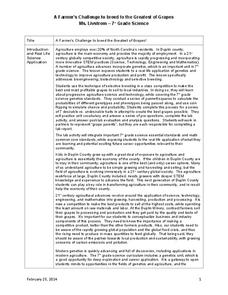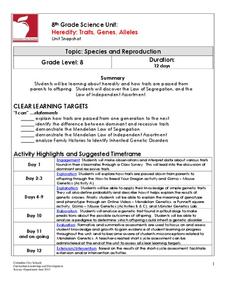Science 4 Inquiry
Genetics, Genetics, and More Genetics: Exploring Independent Assortment and Non-Mendelian Genetics
Two individuals share 99.9 percent of their genetic codes, yet diversity is observed everywhere. Young scientists learn about diversity through hands-on activities and an experiment. They apply the concepts of independent assortment and...
Core Knowledge Foundation
Genetics and the Master Race
How did the beginnings of genetic research influence the Nazi party? A thorough, engaging unit incorporates the work of Gregor Mendel, the study of inherited traits, and the use of racism and discrimination during the Holocaust.
US National Library of Medicine
Monster Genetics Lab
Harness young scientists' knowledge of genetics with an engaging science activity. Learners start by flipping a coin to determine the genotypes and phenotypes of two parent monsters, before using Punnett squares to...
Curated OER
Dragon Genetics Lab-Principles of Mendelian Genetics
Students study genetic traits using popsicle sticks as chromosomes. In this biology instructional activity, students explain how traits are inherited from parents. They differentiate dominant and recessive genes.
LABScI
Genetic Equilibrium: Human Diversity
Investigate the Hardy-Weinberg Principle to explain genetic equilibrium. The 10th lesson plan of a series of 12 is a laboratory exploration of genetic equilibrium. Your classes use a mixture of beans to model allele and genotype...
Kenan Fellows
A Farmer’s Challenge to Breed to the Greatest of Grapes
What does your class know about GMOs? Are they savvy to selective breeding? Challenge young minds to engineer the greatest crop of all time using a hands-on genetics unit. Learners discover the good and bad details of selective breeding,...
Columbus City Schools
Heredity: Traits, Genes, Alleles
If you knew people would pay extra for a bald dragon, could you pick which parents you should breed in order to get the highest number? The unit examines heredity and genetics through breeding dragons, mice, dogs, and tries to figure...
University of Georgia
Monohybrid Crosses and The Punnett Square Lesson Plan
Looking for a quick, hands-on activity to teach young scientists about Punnett squares through monohybrid crosses? then check out this one.
Curated OER
Genetics Mendelian
Students explore genetic terms, the Law of Dominance and the contributions of Gregor Mendel. After discussing Mendel's lab and his pea plants students observe examples of a phenotype chart. Afterward, they conduct their own lab to...
Curated OER
The Electrophoresis of Human Hemoglobin
Students are presented with a scenario that requires them to electrophoreses human hemoglobin samples in order to confirm a diagnosis of sickle cell anemia and/or to determine whether individuals in the scenario are carriers of the...
Curated OER
Cell Reproduction and Inheritance
Students determine their inherited characteristics from their parents. In this biology instructional activity, students study the life of Mendel using an interactive website. They differentiate dominant and recessive characteristics.
Curated OER
Comparative Embryological Study of
Pupils complete two labs. They observe the fertilization and development of sea urchin and zebrafish embryos. They examine the similarities and differences in the development of an invertebrate vs. a vertebrate animal.
Curated OER
The Electrophoresis of Human Hemoglobin
Students analyze different types of hemoglobin. They use the technique of agarose gel electrophoresis to separate human hemoglobin molecules according to their electrical charge, size, and/or shape. Students relate the migration of...














